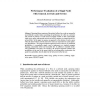Free Online Productivity Tools
i2Speak
i2Symbol
i2OCR
iTex2Img
iWeb2Print
iWeb2Shot
i2Type
iPdf2Split
iPdf2Merge
i2Bopomofo
i2Arabic
i2Style
i2Image
i2PDF
iLatex2Rtf
Sci2ools
200
click to vote
ASMTA
2011
Springer
2011
Springer
Performance Evaluation of a Single Node with General Arrivals and Service
Queueing delays experienced by packets buffered at a node are among the most difficult to predict when considering the performance of a flow in a network. The arrivals of packets at a node tend to be highly variable so that a finite-buffer single-server queue with general arrivals and service emerges as a natural model of a network link. In this paper we propose an approach to the solution of such a queue when the times between arrivals and service times are represented as acyclic phasetype distributions. The proposed solution approach, based on the use of conditional probabilities, is conceptually simple, easy to implement in a standard computer language, numerically robust and reasonably fast. In addition to standard steadystate probabilities and queue size averages, the proposed approach produces the probabilities of the state of the queue found by an arriving packet, in particular, the packet loss probability, directly linked to the QoS perceived by the user.
Related Content
| Added | 24 Aug 2011 |
| Updated | 24 Aug 2011 |
| Type | Journal |
| Year | 2011 |
| Where | ASMTA |
| Authors | Alexandre Brandwajn, Thomas Begin |
Comments (0)

